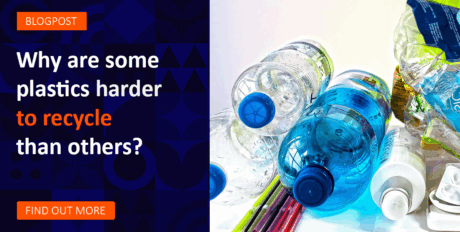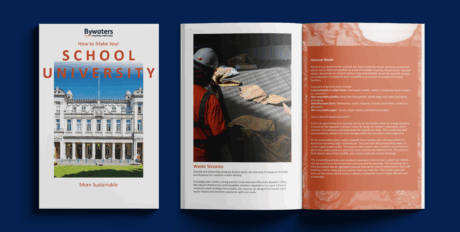Contact us today for your Free Quote
At Bywaters, we’re honoured to partner with FEAST With Us, a remarkable charity tackling two critical issues at once: food poverty and food waste. Operating across London, FEAST With Us provides regular, nutritious meals to people experiencing food insecurity, all made from surplus ingredients that would otherwise go to waste. What sets FEAST apart is their community-driven approach, combining food with friendship, dignity, and inclusivity. Through the dedication of volunteers and the strength of local partnerships, FEAST With Us is not just feeding people, but also helping them build skills, confidence, and connection. Together, we’re working towards a fairer, more sustainable food system for all.
Q&A with Eleanor Butterworth from FEAST With Us:
- What inspired the founding of FEAST With Us, and how has your work grown since then?
FEAST was founded by NHS Dietician, Hannah Style, in response to the lack of access to affordable, nutritious food within the homeless community. FEAST started as a grass roots community project, serving nutritious meals once a month at a Sapphire Independent Housing hostel in Kilburn. We’re still providing meals here today (though twice a week rather than monthly!), plus 14 other sites across Camden, Islington and Barnet. We’re now cooking over 28,000 meals per year, saving over 12,000kg surplus food and delivering Healthy Eating on a Budget programmes to empower our service users with accessible, practical cooking skills and nutrition knowledge. - Can you walk us through a typical FEAST meal session and what makes it unique?
Because we cook with surplus food, we never know what exactly we’ll be cooking with. Essentially, our cooking sessions take a “Ready Steady Cook!” structure, whereby our volunteers and chef must think on their feet and design healthy, tasty dishes with what they have available. Our volunteers are supported by a chef who can provide guidance and inspiration when needed. Once the team has cooked their meals, we sit down and eat together with our service users – this is our community meal. - Where does your surplus food come from, and how do you manage the logistics?
We partner with various surplus food redistribution charities, such as the Felix Project and City Harvest, who do an incredible job at rescuing good food which would otherwise be wasted. They have teams of volunteers who deliver crates of surplus to our kitchens throughout the week; though we also have a hybrid van that our volunteers use to collect larger quantities of surplus from the City Harvest warehouse. We’re always looking for volunteer drivers to help us with these collections as they’re a really valuable source of food, but rely on dedicated volunteers to take the time to secure this. - How do you support guests beyond just providing meals, such as with nutrition workshops or skill development?
In addition to our community meals, we deliver a Healthy Eating on a Budget (HEB) programme with our community service partners. The programme has been co-designed by our nutritionists and service users to empower people experiencing food insecurity to independently meet their nutritional needs. This programme equips participants with the knowledge, practical cooking skills and confidence to prepare balanced, affordable meals, manage portions, and budget effectively for lasting, healthy change. - How important are volunteers to your mission, and what roles do they take on?
FEAST simply couldn’t support vulnerable people living in London without our incredible team of over 200 volunteers. From preparing our nutritious meals to collecting surplus food to applying their skills behind the scenes, their dedication ensures we can make a meaningful impact, nourishing those who need it most. We have volunteers cooking in our kitchens, delivering meals and surplus food, supporting our marketing and fundraising teams, and assisting our HEB programme delivery. We also welcome corporate volunteer teams in to support one-off cooking sessions, and had over 450 join us in 2024 - Have you seen changes in guests’ lives through regular involvement with FEAST?
Yes! In our latest impact report, FEAST recorded 72% of our service users reporting improved access to food through FEAST meals; 68% eating more fruit and veg; 90% feeling well-nourished after a FEAST meal; and 83% feeling a sense of community at FEAST. Moreover, 100% of our HEB programme participants have demonstrated increased nutritional knowledge, used budgeting strategies to maintain a healthy diet and regularly cook meals for themselves or others as a result of joining our workshops. You can read a couple of case studies from our service users in our 2024 impact report. - What’s one story that really captures the heart of what FEAST does?
Tauhida’s story – HEB Programme participant to weekly FEAST volunteer. After completing the Healthy Eating on a Budget programme at the Fitzrovia Community Centre in April 2024, Tauhida felt inspired to give back and volunteered to support new groups. “Since coming to London, I’ve always wanted to volunteer,” she shared. “Sandra, who runs the programme, makes you feel like part of a family. I love cooking, so it felt natural to get involved. It’s been such a positive environment, and I enjoy helping out and giving back.” Looking ahead, Tauhida hopes to deepen her knowledge of nutrition and continue supporting others in her community. Inspired by her father’s philanthropic spirit, she’s eager to share what she’s learned to help others lead healthier lives. Tauhida’s journey highlights the power of volunteering not just to make a difference in others’ lives, but to create a supportive community. You can hear more from our service users here. - How does your partnership with Bywaters help you operate more sustainably?
Bywaters support FEAST in a myriad of ways, all with the goal of reducing food waste and improving sustainability. Over the last two years, Bywaters have volunteered in our kitchens, ensuring regular cooking support and delicious meals for our service users; donated surplus food by collaborating with clients such as the O2, boosting our access to good, nutritious food; and invited FEAST to join their team at community events, enabling us to share our mission, recruit potential volunteers and explore alternative approaches to sustainability. Coinciding with their voluntary efforts, Bywaters continue to contribute financial donations which go a long way in sustaining FEAST’s daily operations and services. - Why do you think waste management and food justice go hand in hand?
Food injustice is a complex and multifaceted societal challenge. The food system is influenced by a myriad of inputs, outputs and stakeholders, and includes everything from food production, supply, retail, procurement, accessibility, affordability, consumption and, eventually, waste. Sustainable food waste management is vital to ensure that nutritious, edible food is put back into the food system and is accessible, particularly to the most vulnerable. Additionally, we must ensure that food that is no longer edible is disposed of safely and sustainably, minimising its impact on the environment. - What are your hopes and goals for the next year at FEAST?
2025 marks FEAST’s 10th birthday, so it’s a super exciting time for us! This year is one of reflection, celebration and looking ahead to the next chapter for FEAST. We’re all aware of the various challenges the last few years have thrown at us as a community, but it’s important to recognise the amazing things we’ve achieved together and continue responding to the ever-changing need within the local community. We’re hoping to expand our HEB Programme to increase our reach and work with more people experiencing food insecurity. We’re also piloting a new community cooking service to offer those without access to kitchens a space to cook and eat together, rather than simply receiving a pre-cooked meal. Other exciting projects include a digital recipe book, packed with nutritious, accessible recipes; new meal services across new London boroughs; and various fundraising campaigns for our birthday celebrations. - Are there any new initiatives or events coming up you’d like to highlight?
Any of our 10th birthday events! We’re inviting FEAST volunteers and partners to join a selection of our festive community meals, running between May-September this year. We’re also planning a 10km walk from our first to latest community meal venues. This walk is open to all and is a great way to learn a little more about FEAST and encourage some donations in the meantime! - How can individuals or companies get involved and make a difference?
Head to our website if you’d like to volunteer, donate or support FEAST in any other way.
Stop Food Waste Day specific questions
- In your experience, what are the biggest misconceptions people have about food waste?
The assumption that all food waste is simply plate waste (I.e. Scraps leftover once a meal has been prepared and eaten) and the unawareness of what is and isn’t edible food (cauliflower stalks and leaves are a prime example!). Recognising that food waste is an output at various points of the food system, including produce left unsold by retailers, or too “wonky” to buy from farmers and producers, and isn’t just household waste. As a result, so much food waste, or surplus food, is not only completely edible, but nutritious and delicious! However, when it comes to household waste, there’s also plenty to be done to minimise this and utilise what we have access to. This may include using the stalks of broccoli and cauliflower in our dishes, or saving vegetable scraps to use in a stock. There’s so much we can do as individuals to reduce food waste and rethink how this is used across the food system. - What are three simple things individuals can do at home to reduce their food waste?
1) Use the whole vegetable! Don’t throw away cauliflower leaves but use them like spinach or kale, save onion peels, carrot tops and other scraps to use in a stock, and roast squash seeds for a high-protein snack. 2) Plan ahead when you do your food shop. Menu planning is a great way to ensure you only buy what you need, saving you money and preventing waste.
3) Use your freezer. Any leftover portions at dinner can be frozen to eat on another day. You can also prepare raw ingredients, such as vegetables, cheese and meat, and freeze it so it’s ready to add to a future dish. - Can you share tips on how people can better use leftovers or surplus food creatively?
Slice the stalks of broccoli and cauliflower to add to your dishes (they cook like carrots). Use cauliflower and broccoli leaves like you would spinach or kale. Use bell pepper seeds in home-made pesto. Turn surplus apples into healthy crisps by slicing thinly and cooking for 10 minutes. Turn squash and pumpkin seeds into a healthy snack by washing them, drizzling with olive oil and a little salt, and roasting. - How does reducing food waste help with addressing food poverty in London?
Reducing food waste ultimately means there’s better access to good, healthy food, especially for the most vulnerable. According to The Felix Project, the equivalent of 15 billion meals is waited in the UK ever year. If we all play our part, both at an individual and organisation level, and do what we can to reduce food waste, we can have a significant impact on food security in our community.
More posts:
Valentine’s Day: History, Tradition, and Its Modern Impact
This post traces the evolution of Valentine’s Day from ancient Roman rituals to a global commercial event. It highlights the holiday’s hidden environmental impact and offers a guide to celebrating sustainably through “Circular Romance” and waste reduction.
Read morePlastic Recycling: Why Are Some Types Harder to Process Than Others?
Some plastics recycle easily, while others are difficult or impractical to process at scale. This article explains why material type, packaging design, contamination and recycling infrastructure all play a role, and what businesses can do to improve plastic recycling outcomes in the UK.
Read moreThe Ultimate Guide For a Sustainable School and University
Download The Ultimate Guide For a Sustainable School or University. Get the roadmap to cut costs, reduce your carbon footprint, and boost your ESG profile with 5 core pillars.
Read more




